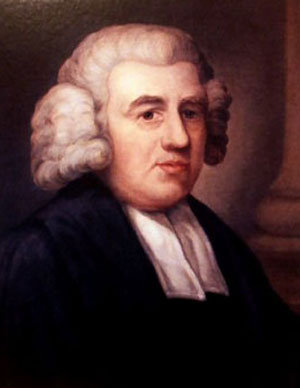
Amazing Grace
#649 in Glory to God
#280 in The Presbyterian Hymnal
As a young man, John Newton was a mess. Perhaps because his mother died when he was very young and his father, a ship captain, was away at sea for years at a time, John had developed into an incorrigible boy before he even reached his teens. In 1736, when John was eleven years old, he went to sea on his father's ship. He sailed with his father for six years; however, his father's influence was not enough to improve his character or tame his mouth.
John continued as a sailor after his father retired, but frequently had to be punished for his offensive behavior. Even among notoriously vulgar sailors, John was considered a foul-mouthed reprobate. After a series of humiliating experiences brought on by his poor choices, John was expelled from the British navy and was held as a slave in Africa.
Eventually, one of his father's friends rescued him and was bringing him back to England. John was penniless. He was broken by disease and malnutrition, and everyone who knew him considered him to be a troublemaker with a foul mouth and no sense of morals. His reputation made people eager to avoid him.
On the way home to England, their ship was caught up in a fierce storm and was apparently about to sink. Fearing for his life, the 25-year-old infidel began to pray. Years later John would identify that moment as when he began to become a Christian.
All of us would like to imagine that from that moment on John lived as a perfect Christian gentleman. 'Fraid not. At this time, Newton was still ignorant of many of the basic teachings of Jesus. His spiritual journey still had more than its share of mistakes, bad choices, and failures. In 1750, through his father's contacts and money, he became the captain of slave ships carrying kidnapped men, women, and children from Africa to the West Indies. Although he later regretted his work and became active in the abolition movement, at that time, being the captain of a slave ship earned John a lot of money because few other sea captains were willing to be part of the slave trade. Evidently, John's reputation couldn't get any worse, and he did enjoy the money.
Then in 1754, at 29 years-old, John's history of disease, malnutrition, and riotous living caught up with him. He suffered a stroke and never went to sea again.
Beginning in 1755 as he recovered from his stroke, John began reading the Bible. Then he began studying theology, Greek, and Hebrew. When he thought he was ready, he applied to be ordained in the Anglican Church. Several bishops considered his reputation from his days as a sailor and as a slave-ship captain, and turned him down. He applied to the Methodist church. They turned him down. He applied to the Independent churches. They turned him down. He applied to the Presbyterian church. Again, he was turned down. Finally, when John was nearly 40 years-old, the Anglican bishop of Chester, England became convinced that John was truly reformed. John Newton was finally ordained in June 1764.
Along with writing his sermons, John also wrote poetry to express his reflections on a variety of spiritual issues. Several of his poems were set to music and eventually included in The Sacred Harp, a hymnal that was very popular in the American South. Two of these hymns are included in the Glory to God hymnal that many Presbyterian churches use today. One is "Glorious Things of Thee Are Spoken." which is hymn #81 in Glory to God. The other was originally titled "Faith's Review and Expectation." It begins with the words,
Amazing grace! (how sweet the sound)
That sav'd a wretch like me!
I once was lost, but now am found,
Was blind, but now I see.
John Newton's testimony in this hymn is addressed especially to those of us who know all too well that we aren't perfect: those of us that sometimes wonder if God would, or could, ever forgive us. John knew very well that God's forgiveness, God's love, and, especially, God's grace are truly amazing. If you ever worry that you've sinned too much for God to forgive you, I invite you to sing this hymn along with John Newton and the rest of us blind wretches.
Like the story Jesus told of the father with a prodigal son, God is always eager to welcome us home.
Never forget that God loves you, and so do I.
Stu Smith
The Text
Amazing grace, how sweet the sound,
that saved a wretch like me!
I once was lost, but now am found,
was blind, but now I see.
'Twas grace that taught my heart to fear,
and grace my fears relieved.
How precious did that grace appear
the hour I first believed!
Through many dangers, toils, and snares,
I have already come:
'Tis grace has brought me safe thus far,
and grace will lead me home.
The Lord has promised good to me;
his word my hope secures.
He will my shield and portion be
as long as life endures.
When we've been there ten thousand years,
bright shining as the sun,
we've no less days to sing God's praise
than when we'd first begun.
Stanzas, 1-4 John Newton, 1772.
The Hymn
A Version for This Pandemic

From the Rev. Stu Smith: My first visit to Camp Carew was when I came under care of the Presbytery of Southeastern Illinois at a meeting held at camp in 1987. I was ordained and served in Chicago for over 25 years. I received my Doctor of Ministry Degree from McCormick Theological Seminary in 2001 with a concentration in Religious Education. My doctoral thesis was Out of the Church Basement and into Cyberspace: Internet-Based Religious Education for Youth.
In 2014, I moved back to my family farm in Vermilion County. I'm very proud to be associated with Kemmerer Village and Camp Carew and the powerful ministry with young people that they provide.

Camp Carew welcomes campers from all religious traditions.
Camp Carew is a drug- and alcohol-free environment.




